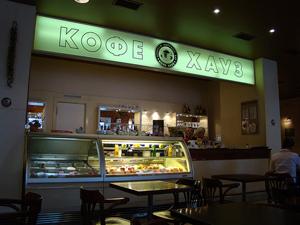Corruption in Kiev
(Image by Flickr user Vasenka (cc:by))
This story was originally reported by PRI’s The World. For more, listen to the audio above.
Ukraine’s capital, Kiev, is teeming with coffee shops. Most have cropped up in the last five or six years. One American expatriate aimed to join the ranks of Ukraine’s baristas eight years ago, but found that the procedure for opening a business in Kiev is a far cry from his native Chicago.
Andreas Nemickas, who is fluent in Russian, came to Ukraine a decade ago as a small business consultant. He was well aware of the challenges of starting a business here, but he wanted to try for himself. So, eight years ago, he used all of his savings to buy a piece of property in a prime location downtown, and went about getting the necessary permits and approvals to renovate it.
There was just one problem, according to Nemickas: “Bribes, bribes and more bribes.” Anyone who had anything to do with his business wanted a piece of the earnings, including “the health inspectors, the fire inspectors, the police, the city architect, [and] the tax police.” Despite the pervasiveness of the issue, Nemickas swore that he wouldn’t pay a thing.
His refusal to bribe resulted in a long, firsthand education in Ukrainian capitalism. Nemickas says that one official demanded $30,000 just to sign a permit. In most cases, though, public officials are more discreet. If a business owner needs an approval from an inspector or a signature to proceed, it seems there is always an excuse not to give it.
Ventilation systems or fire exits are never quite right, even where everything is up to code. “Or they think that the toilet, where you’re planning to put it, they want you to move it to the complete other side of the property,” explains Nemickas, “and you try to explain well physically that’s not possible, and they say well that’s what you need to do.”
Officials give the name of an architect or contractor that can fix the property’s design… inevitably one of the official’s relatives.
The local wisdom is that bribery is a holdover from Soviet times, when government salaries were barely enough to live on. Back then, bureaucrats supplemented their meager incomes by accepting gifts of sausage or homegrown cucumbers. Now, they want cash, and it is stifling business. Out of the 180 countries ranked on Transparency International’s annual Corruption Perceptions Index, Ukraine ranked as the 146th most corrupt country in the world.
“My strict stance was that I wasn’t going to pay a kopek,” said Nemickas. After eight years, stacks of letters and hundreds of meetings, he still hasn’t gotten the necessary permits to open for business.
So he’s given up. He’s not sorry he tried, but he has does have one regret:
“What’s actually most painful is what people here consider to be good coffee. Now all these coffee shops have opened up and people say hey great, no more instant for me. But they’re still not drinking good coffee, and I just know what it can be.”
PRI’s “The World” is a one-hour, weekday radio news magazine offering a mix of news, features, interviews, and music from around the globe. “The World” is a co-production of the BBC World Service, PRI and WGBH Boston.
